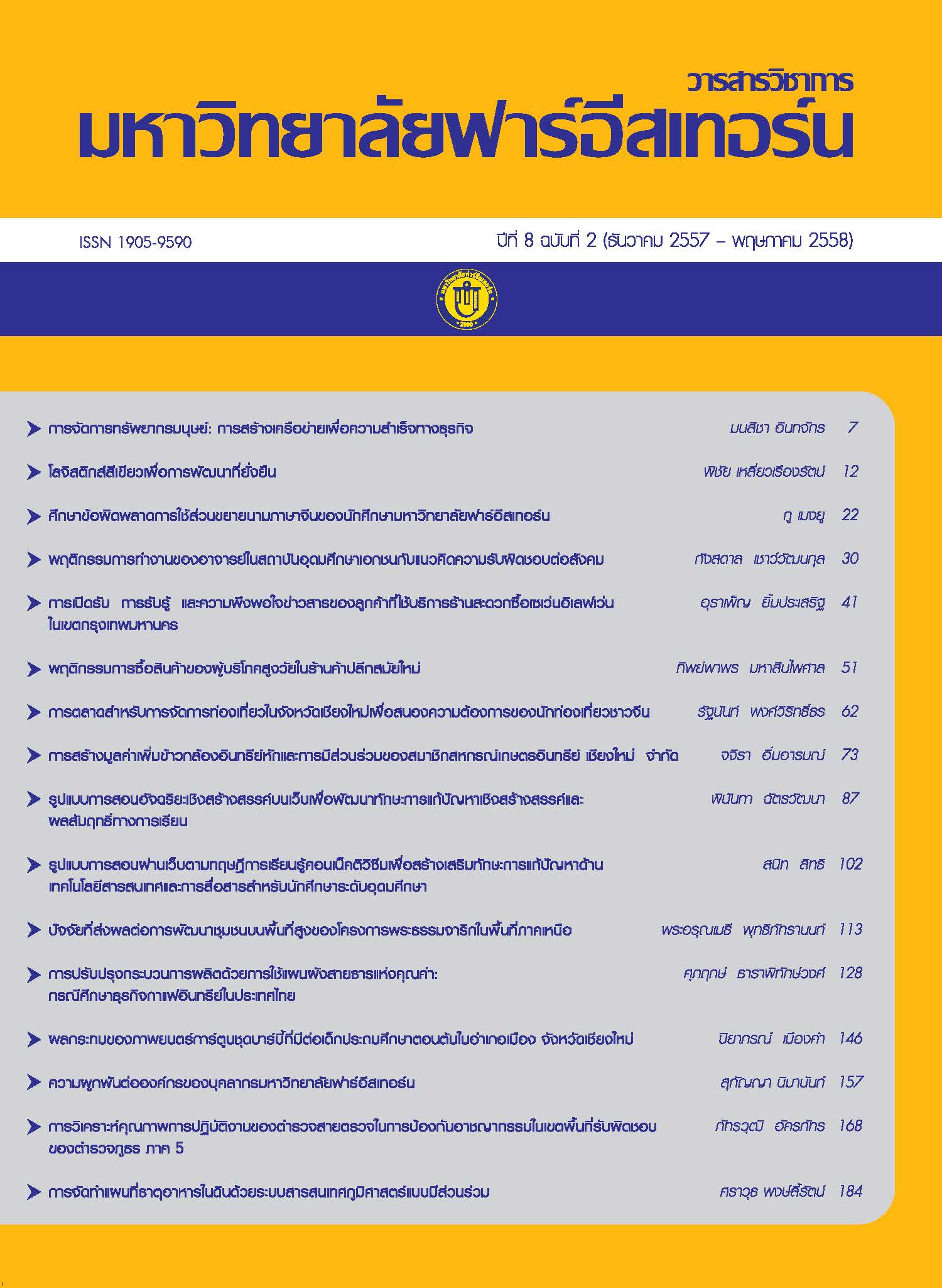รูปแบบการสอนผ่านเว็บตามทฤษฎีการเรียนรู้คอนเน็คติวิซึมเพื่อสร้างเสริมทักษะการแก้ปัญหาด้านเทคโนโลยีสารสนเทศและการสื่อสารสำหรับนักศึกษาระดับอุดมศึกษา
Main Article Content
Abstract
การศึกษานี้มุ่งพัฒนารูปแบบการสอนผ่านเว็บตามทฤษฎีการเรียนรู้คอนเน็คติวิซึมเพื่อสร้างเสริมทักษะการแก้ปัญหาด้านเทคโนโลยีสารสนเทศและการสื่อสารสำหรับนักศึกษาระดับอุดมศึกษา โดยรูปแบบการสอนผ่านเว็บที่พัฒนาขึ้นนี้เรียกว่า pbCONNEC Model ในการวิจัยเชิงทดลอง ประชากรคือ นักศึกษาระดับปริญญาตรี ชั้นปีที่ 1 คณะวิทยาศาสตร์ มหาวิทยาลัยแม่โจ้ จำนวน 97 คน กลุ่มตัวอย่างได้โดยใช้วิธีการสุ่มแบบกลุ่ม จำนวน 2 ห้องเรียน ห้องเรียนหนึ่งเป็นกลุ่มทดลองซึ่งสอนด้วยรูปแบบการสอนผ่านเว็บด้วย pbCONNEC Model จำนวน 30 คน อีกห้องเรียนหนึ่งเป็นกลุ่มควบคุมซึ่งสอนด้วยรูปแบบการสอนผ่านเว็บแบบปกติ จำนวน 30 คน เครื่องมือที่ใช้เก็บรวบรวมข้อมูล ประกอบด้วย แบบทดสอบวัดผลสัมฤทธิ์ทางการเรียน เป็นข้อสอบแบบปรนัย 60 ข้อ แบบทดสอบวัดทักษะการแก้ปัญหา เป็นข้อสอบแบบอัตนัย 6 ข้อและแบบสอบถามความพึงพอใจ ผลการวิจัยพบว่า 1) รูปแบบการสอนผ่านเว็บด้วย pbCONNEC Model แบ่งออกเป็น 3 ส่วน ได้แก่ ส่วนแรกเป็นผู้อำนวยการเรียนรู้ ประกอบด้วยกำหนดกรอบแนวคิดและการกระตุ้นการเรียนรู้ ส่วนที่สองเป็นคอนเน็คติวิซึม : การเรียนรู้คือกระบวนการเชื่อมโยง ประกอบด้วยวัฎจักรการจำแนกการเรียนรู้คอนเน็คติวิซึม วัฎจักรการเรียนรู้โดยใช้ปัญหาเป็นฐาน และส่วนที่สามเป็นผลการเรียนรู้ ประกอบด้วยความรู้ เจตคติและทักษะ 2) บทเรียนด้วยรูปแบบการสอนผ่านเว็บ มีประสิทธิภาพ 88.12/87.67 3) ผลสัมฤทธิ์ทางการเรียนระหว่างกลุ่มทดลองและกลุ่มควบคุมมีคะแนนเฉลี่ย แตกต่างกันอย่างมีนัยสำคัญทางสถิติที่ระดับ .01 4) ผลสัมฤทธิ์ทางการเรียนมีความสัมพันธ์เชิงบวกกับทักษะการแก้ปัญหาของนักศึกษาที่เรียนรู้ด้วย pbCONNEC Model อย่างมีนัยสำคัญทางสถิติที่ระดับ .01 และ 5)
ความพึงพอใจของนักศึกษาที่มีต่อบทเรียนด้วย pbCONNEC Model มีค่าเฉลี่ย 4.33 อยู่ในระดับมาก
This study aimed to develop web-based instruction model based on connectivism learning theory to enhance problem-solving skill in ICT of higher education students which have been called pbCONNEC model. This experimental research was used for evaluating the effectiveness of the model. The population was 97 first- year undergraduate students in the second semester of the 2013 academic year, Faculty of Science, Maejo University in Chiang Mai province. The samples were two classrooms by cluster random sampling. One classroom was 30 students. It was serving as an experimental group taught with the pbCONNEC model whereas the other was serving as a control group taught with the traditional web-based instruction. This research instruments were achievement test which was 60 items of multiple choice question, problem-solving skill test which was 6 problems of question, and satisfaction questionnaire. They were used to assess students’ achievement before and after treatment. The findings suggested that 1) the web-based instruction model composed of three parts: the first part is the learning facilitator, the second part is connectivism: learning as connecting process including connectivism taxonomy and problem-based learning cycle, and the third part is learning outcomes: knowledge, attitude, and skills, 2) the efficacy of the pbCONNEC model was 88.12/87.67, 3) the mean score of achievement between experimental and control group was different with statistical significance at .01 level, 4) the score of achievement was positive relation with the problem-solving skill score of experimental students with statistical significance at .01 level, and 5) there was a high level of satisfaction ( = 4.33) taught with the pbCONNEC model.
Article Details
1. Any views and comments in the Journal of Social Innovation and Lifelong Learning are the authors’ views. The editorial staff have not to agree with those views and it is not considered as the editorial’s responsibility.
2. The responsibility of content and draft check of each article belongs to each author. In case, there is any lawsuit about copyright infringement. It is considered as the authors’ sole responsibility.
3. The article copyright belonging to the authors and The Far Eastern University are copyrighted legally. Republication must be received direct permission from the authors and The Far Eastern University in written form.

